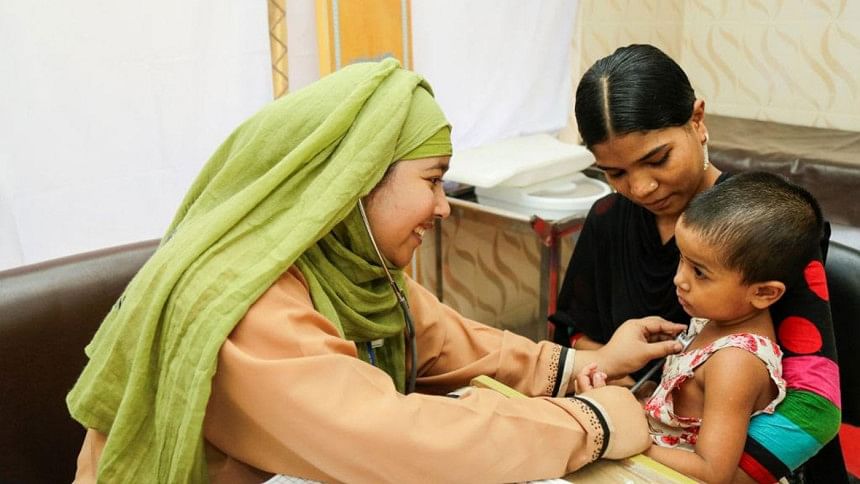Can the health sector withstand the threat of Covid-19?

Bangladesh is celebrated as a development success in South Asia and has outperformed many of its neighbours on social development indicators. A key driver of this success has been the country's impressive outcomes in health. These hard-earned achievements are now being undermined by Covid-19. Curbing the spread of the virus in these unprecedented times is of utmost importance. However, we should not lose sight of other essential healthcare needs, which if neglected, will place additional strain on the healthcare system.
Despite the recent progress, the pandemic has exposed systemic weaknesses in the health sector such as inadequate financing (less than 1 percent of the country's GDP is allocated to health), shortage of skilled personnel across the health system, poor infrastructure, weak monitoring and governance, and inadequate coordination among key stakeholders. Threats posed by Covid-19 will significantly compound these existing challenges. The health sector will require substantial amount of additional funding to respond to the pandemic, but this additional funding must not come at the expense of other critical health services.
Our analysis of government data suggest that overall government hospital admissions have declined by 63 percent over the last few months. This includes a 73 percent decline in the number of patients with acute heart and cardiovascular diseases and more than a 50 percent reduction in patients with kidney failure. Anecdotal evidence suggests that during this pandemic, many patients were not allowed into hospitals without a negative Covid-19 test certificate even when they had an emergency.
These trends are particularly concerning for maternal and child health. Over the past few months, the number of pregnant women receiving at least one antenatal care visit declined by 46 percent, the number of deliveries by doctors or midwives fell by 14 percent, and hospital deliveries declined by 43 percent.
New projections from the United Nations Population Fund (UNFPA) predict that globally more than 47 million women and girls could lose access to family planning, leading to 7 million unintended pregnancies due to Covid-19. The report highlights that many women are forgoing important medical appointments because of fear of contracting the virus, which sheds some light on the above data.
Bangladesh has also seen a recent drop in routine immunisations with data showing a 20 percent decline in immunisation sessions, resulting in considerable reductions in essential vaccinations such as the BCG (around 50 percent), measles and rubella, PENTA 1 and PENTA 3.
In addition, global trends show a rise in gender-based violence and mental health issues owing to lockdown measures. The burden of mental health disorders in the country is yet to be fully understood, but the pandemic's mental and psychological implications cannot be ignored. Isolation, loss of loved ones, lack of job and economic security and increased inequality, will all adversely impact mental and physical health.
A recent article by Brac reported that quarantine measures and social isolation for Covid-19 positive patients "is leading to family and friends abandoning their relatives and fleeing their residences in fear of retribution". The stigma associated with Covid-19 will exacerbate people's health and livelihoods.
In light of these challenges, we propose three immediate measures for the government to consider:
i) The government should allocate additional funding to the health sector in its next budget. It could consider the WHO's recommendation of increasing health spending to 4 percent of GDP. While additional financing is justifiably required for Covid-19, funding should not come at the cost to other essential healthcare needs. The government should continue to prioritise areas such as maternal and child health, communicable and non-communicable diseases, to reduce the overall impact on the health sector. Furthermore, another concern with limited government spending on healthcare is that a very high percentage (66 percent) of the total health expenditure is currently met by households themselves, pushing them deeper into poverty.
ii) Increase ongoing collaboration and close coordination with key stakeholders within government ministries and departments, the private sector, NGOs, and the international donor community to pool resources and to align efforts. Strong commitment and harmonisation across the sector will be key to attaining SDG 3 and other related SDG targets within the stipulated period.
iii) Renew focus on vulnerable populations and underscore the importance of mental health. Even though the lockdown has been lifted, repercussions of the pandemic and other health concerns could be felt for quite some time. A commitment from the government to prioritise support for vulnerable groups and overall mental and physical wellbeing of its citizens will be an important stepping-stone in the nation's recovery.
While the healthcare system in Bangladesh is justifiably prioritising its response to the pandemic, it would be myopic for the government to put aside other essential healthcare needs at this time. The importance of the health sector is not only in ensuring healthy lives but also the considerable role it plays in the economy in general. Policy decisions around financing and responding to the pandemic need to be reinforced through ongoing commitments to the overall health sector, to avert a broader public health and economic crisis.
Samiha Barkat, MPH is a development specialist, email: [email protected]; Barkat-e-Khuda, PhD is former professor and chairman, Department of Economics, University of Dhaka, email: [email protected].

 For all latest news, follow The Daily Star's Google News channel.
For all latest news, follow The Daily Star's Google News channel. 



Comments